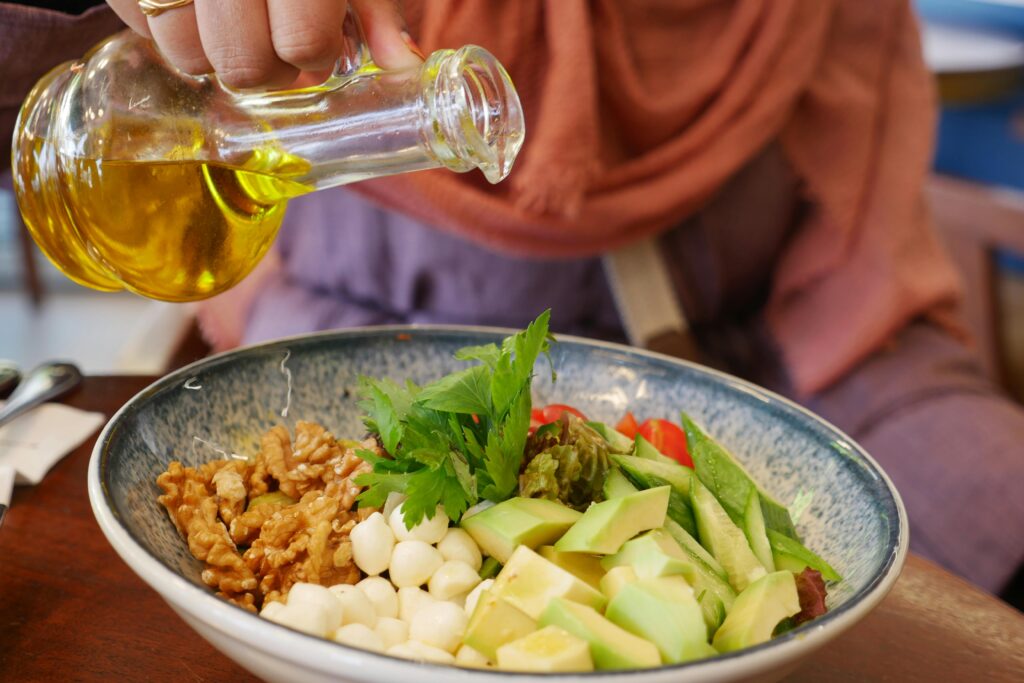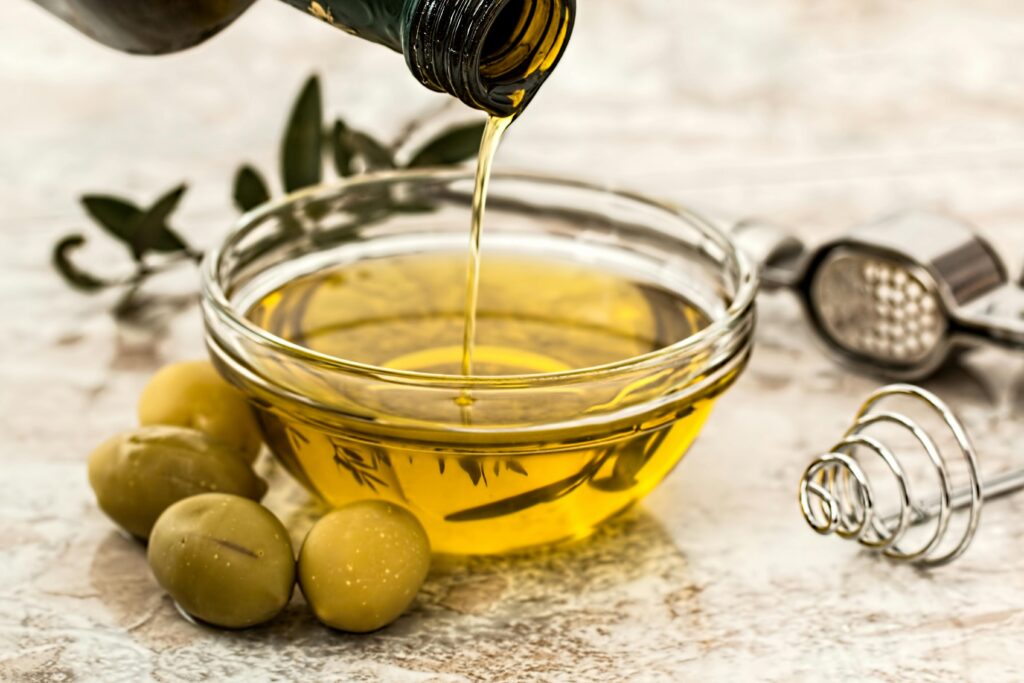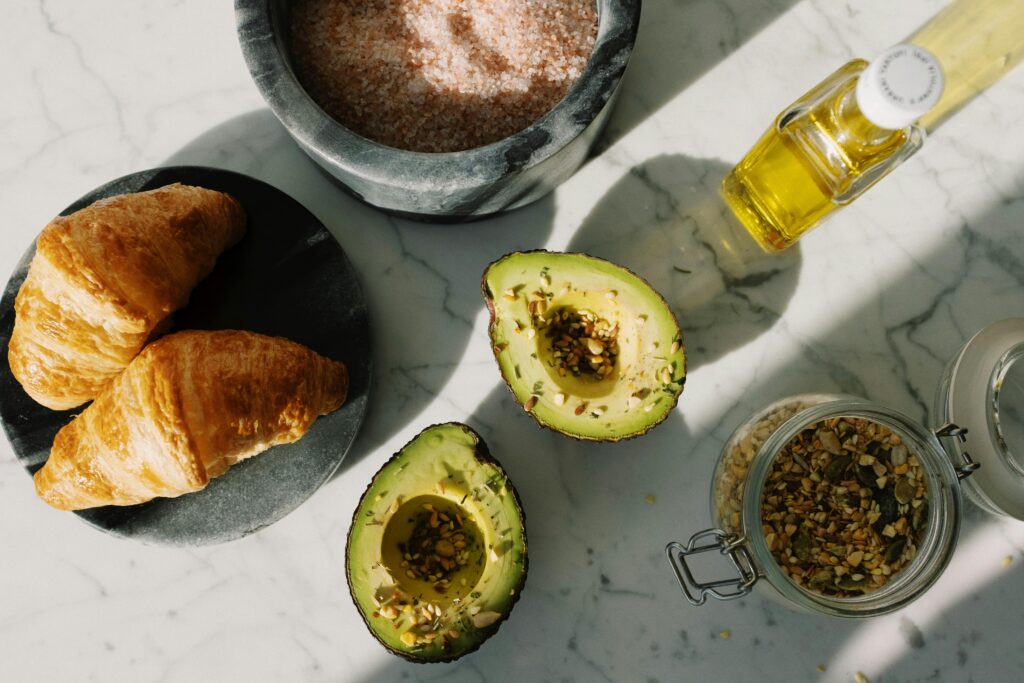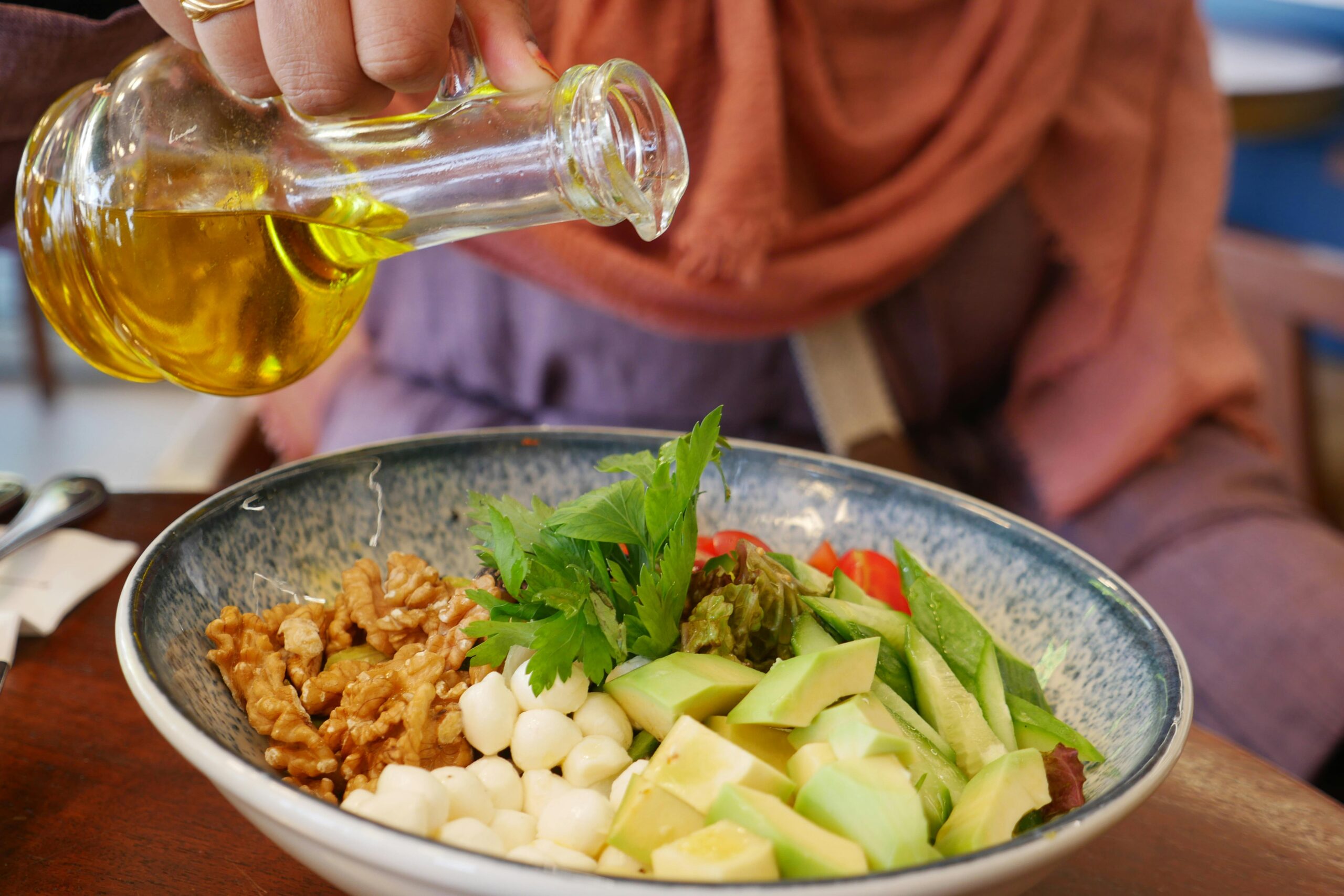
Overview
Cooking oils are essential in the kitchen, playing a key role in flavor, texture, and nutrition. Among the most popular choices, olive oil and avocado oil stand out as healthy, versatile options. Olive oil has been a cornerstone of the Mediterranean diet for centuries, lauded for its longevity-enhancing properties. In contrast, avocado oil, derived from the fruit of the avocado tree (Persea americana), has gained widespread acclaim for its nutrient density and suitability for high-heat cooking.
Both oils are packed with monounsaturated fats (MUFAs), making them healthier alternatives to saturated fats like butter. But how do they compare? This comprehensive guide explores their benefits, downsides, and best uses to help you decide which is better for your cooking needs
What Is Olive Oil?

Olive oil is extracted from the fruit of the olive tree (Olea europaea). It comes in various grades, the most notable being Extra Virgin Olive Oil (EVOO), known for its purity and robust flavor. Olive oil is prized not just for its culinary uses but also for its proven health benefits, particularly in heart health and inflammation reduction.
What Is Avocado Oil?

Avocado oil is made from the pulp of the avocado fruit, offering a mild flavor and high smoke point. While it is newer to the market compared to olive oil, it has quickly gained popularity due to its nutritional profile, which closely matches olive oil in terms of healthy fats and antioxidants
Related : 9 Signs You’re Eating Too Much Salt and How to Cut Back
Benefits of Olive Oil
Rich in Monounsaturated Fats (MUFAs)
Olive oil is about 70% MUFAs, predominantly oleic acid. These healthy fats have been linked to numerous health benefits, including:
- Lowering blood pressure: Helps maintain cardiovascular health.
- Reducing heart disease risks: Supports healthy cholesterol levels.
- Promoting gut health: Encourages a diverse microbiome, essential for digestion.
Nutrient-Rich
Olive oil is loaded with vital nutrients such as:
- Vitamin E: An antioxidant that supports skin health and combats oxidative stress.
- Phenolic compounds: Offer anti-inflammatory and antioxidant benefits.
- Phytosterols: Help manage cholesterol levels.
- Carotenoids and chlorophyll: Provide additional antioxidant support
Extra Virgin Olive Oil (EVOO)
EVOO is cold-pressed, meaning it retains its natural nutrients and has a lower free fatty acid content. This enhances its anti-inflammatory properties and preserves its robust flavor.
Downsides of Olive Oil
- Moderate Smoke Point
With a smoke point of around 350°F (177°C), olive oil is not ideal for high-heat cooking like frying or grilling. Exceeding this temperature can degrade its nutrients and alter its flavor.
- Storage Challenges
Olive oil is sensitive to light, heat, and air exposure, which can cause oxidation. To maintain its quality, store it in a cool, dark place in an airtight container.
Benefits of Avocado Oil
High Smoke Point
One of avocado oil’s standout features is its high smoke point of 482°F (250°C), making it an excellent choice for high-temperature cooking methods such as:
- Frying.
- Sautéing.
- Roasting.
Rich in Nutrients
Related : Superfoods for Women
Avocado oil is nutritionally similar to olive oil and contains:
- Oleic acid (MUFAs): Supports heart health and reduces inflammation.
- β-sitosterol: A phytosterol with anti-inflammatory benefits.
- Antioxidants: Such as lutein and chlorophyll, which protect cells from oxidative damage.
- Unrefined Options
Cold-pressed, unrefined avocado oil retains its natural green color, nutty flavor, and high antioxidant content, offering maximum health benefits.
Downsides of Avocado Oil
- Calorie-Dense
Avocado oil is slightly more calorie-dense than olive oil. While the difference is small, it’s important to practice portion control to avoid unintentional calorie overconsumption.
- Cost
Avocado oil is often more expensive than olive oil, especially in its unrefined form
Related : Why Starving Yourself Isn’t a Good Idea for Weight Loss
Nutritional Comparison
Here’s a side-by-side look at the nutritional profiles of olive oil and avocado oil (per tablespoon)
Nutritional Comparison (Per Tablespoon)
- Calories: 119 (Olive), 124 (Avocado)
- Total Fat: 13.5 grams (Olive), 14 grams (Avocado)
- Saturated Fat: 1.86 grams (Olive), 1.62 grams (Avocado)
- Monounsaturated Fat: 9.86 grams (Olive), 9.88 grams (Avocado)
- Polyunsaturated Fat: 1.42 grams (Olive), 1.89 grams (Avocado)
- Vitamin E: 1.94 milligrams (Olive), 0–7.9 milligrams (Avocado)
- Vitamin K: 8.13 micrograms (Olive), 0 micrograms (Avocado)
Cooking Applications
High-Heat Cooking
- Avocado Oil With its high smoke point, avocado oil is the better choice for high-temperature cooking like frying and roasting.
Moderate-Heat Cooking
- Olive Oil EVOO is perfect for moderate-heat cooking methods such as sautéing and baking, where its flavor and nutrients are preserved.
Raw Use
Both oils shine in raw applications, but olive oil’s bold flavor makes it ideal for salad dressings, drizzles, and dips. Avocado oil’s neutral taste pairs well with delicate recipes
- Olive Oil: Fruity and robust, it complements Mediterranean dishes and hearty vegetables.
- Avocado Oil: Milder in taste, allowing the natural flavors of other ingredients to shine.
Cost Considerations
While olive oil is more affordable and widely available, avocado oil tends to be pricier, especially for cold-pressed varieties. Budget-conscious cooks may prefer olive oil for everyday use
Related : Surprising Signs You May Be Vitamin D Deficient
Which Is Healthiest?
Both oils offer significant health benefits, but their advantages depend on your specific needs:
- Heart Health: Both oils promote cardiovascular health due to their high MUFA content.
- Cooking Versatility: Avocado oil’s high smoke point makes it ideal for a wider range of cooking methods.
- Flavor: Olive oil’s robust taste may be preferable for enhancing dishes.
The Takeaway
When it comes to choosing between olive oil and avocado oil, there’s no definitive winner—they each have their strengths:
- Use avocado oil for high-heat cooking like frying and roasting.
- Choose olive oil for moderate-heat cooking, salad dressings, and dishes where its bold flavor can shine.
Incorporating both oils into your diet allows you to enjoy their unique benefits and elevate your meals. By understanding their differences, you can make informed choices to suit your cooking style and nutritional needs
FAQs About Olive Oil and Avocado Oil
Which oil is better for frying, olive oil or avocado oil?
Avocado oil is better for frying because of its higher smoke point (around 482°F/250°C), making it more stable at high temperatures. Olive oil, especially extra virgin olive oil, is better suited for lower-heat cooking or raw uses.
Is avocado oil healthier than olive oil?
Both oils are equally healthy, as they are rich in monounsaturated fats and antioxidants. The choice depends on your cooking method and flavor preference. Avocado oil is ideal for high-heat cooking, while olive oil is great for moderate heat or raw applications.
Can I use olive oil and avocado oil interchangeably?
Yes, you can use them interchangeably, but their unique properties make them better suited for specific uses. For example, avocado oil is better for frying, while olive oil works well in dressings or as a bread dip.
Does avocado oil cost more than olive oil?
Yes, avocado oil is generally more expensive than olive oil, especially in its unrefined, cold-pressed form. Olive oil is often more affordable and widely available, making it a cost-effective option for daily cooking












